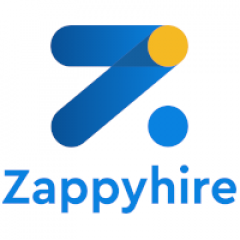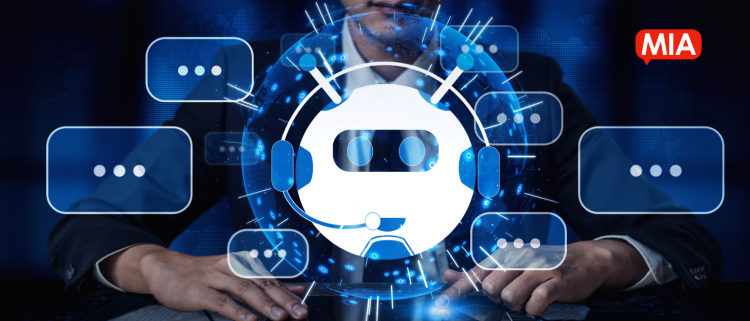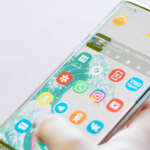The Role of the Artificial Intelligence in the HR Industry Today
Talent acquisition strategies are changing and AI-powered personalized conversational chatbots are leading the way. Here’s why.
In recent years, chatbots have been making their presence felt in every industry. From being a customer service tool, they are now being leveraged by HR teams to communicate with candidates at every stage of the hiring process – from job search to interview scheduling to onboarding.
“If you picture the journey of chatbots from the 1960s to now, you can see that what was once a fantasy of being able to communicate with a non-living virtual being is now a part of our daily lives.”
– Rashid Khan, Author of Build Better Bots
The global recruitment chatbot market saw a significant increase in investment starting in 2018. According to Technavio’s latest market research report, it is expected to grow at a CAGR of 29% over the period 2021-2025.
Before the rise of AI, chatbots were a time-saver capable of performing limited functions that they were specifically programmed to do. In hiring, such bots came in handy when recruitment teams were overwhelmed with applications and needed to find out quickly if an applicant was a right fit. But, organizations started encountering problems with these bots in due time with the advancement of technology as well as the increasing number of job seekers.
Conventional chatbots lack the capability to nurture, support, and guide candidates through the different stages of their recruitment process. This is because these chatbots can only provide basic information repetitively, without any context to it.
Simply put, conventional chatbots are rule-based, conversational chatbots use machine learning and natural language processing to respond to user queries, and recruitment chatbots are conversational chatbots that help businesses automate the recruiting process by interacting and engaging with candidates.
With the proliferation of AI technology, there is a greater need for conversational chatbots that can converse with candidates on a personal level, much like a human recruitment manager would. When such bots are integrated into a website or mobile app, they can engage candidates by answering questions in real-time and even guide them through the entire recruitment process. Such chatbots enable organizations to capture real-time information from candidates that a recruitment manager may overlook in a resume. This helps organizations create better talent pools and drive quality hiring decisions.
Recruiters find recruitment chatbots to be very effective for screening candidates, scheduling interviews, and even onboarding new hires. They can contact multiple candidates simultaneously and schedule interviews with them within minutes. However, there is a lot more that can be done with recruitment chatbots than simply sending automated messages or answering FAQs.
In order to achieve maximum effectiveness, one needs to leverage AI-powered personalized conversational chatbots like Zoey (from Zappyhire,) which has the ability to hold complete conversations with candidates and perform more complex tasks like searching through thousands of resume data points in seconds, asking relevant questions automatically.
According to LinkedIn, with the use of certain AI-based chatbots, organizations can reduce time-to-hire by a whopping 80%.
Why Conventional Chatbots Are Outdated
A conventional chatbot or a general-purpose bot is an automated texting service designed to simulate human conversations in a text format. Built on a rule-based engine, these chatbots can only give you pre-defined answers that are programmed into their system. They do not understand what you speak or ask them; they simply reply based on keywords typed by the users.
These conventional chatbots can answer basic questions about your company’s culture and benefits, but they cannot tell you if a candidate is a good fit for your company or not. And that’s where conversational chatbots step in.
The Key Differentiator of Conversational Chatbots – Understanding Human Intent
Conversational chatbots use Natural Language Processing (NLP) and Artificial Intelligence (AI) technologies to understand human intent and respond accordingly. They are designed to emulate human interactions and can converse with humans without any predefined script, giving customized responses to users based on their needs or intent. This means they can understand human language, interpret it, and respond appropriately – just like humans do, thus making them an invaluable resource when it comes to recruitment.
In the HR industry, AI-powered conversational recruitment chatbots are used by recruiters to automate communication as well as information gathering in the hiring process. These bots are programmed with knowledge about a company’s culture and its hiring policies, which helps them to interact with prospective candidates and answer their queries regarding job openings, company values, any perks or benefits, etc.
AI-Powered Personalized Conversational Chatbots over Conventional Chatbots
Conventional chatbots are programmed with specific information pertaining to job openings and other company details that they cannot handle conversations beyond those parameters. Hence, they lack scalability and lead to increased friction between candidates and recruiters.
Whereas, AI-powered chatbots follow a pattern of natural conversation. They also come with inbuilt emotional intelligence that allows them to sense frustration or indifference from the other side and respond accordingly.
These chatbots can also scale up dynamically depending on the skill set required for handling new job vacancies. This means that a recruiter need not invest in manually training the chatbot for every new position opening up within their organization. It can be done by simply feeding in some data about the specific requirements for a job opening in the system. With its ability to self-learn and fill gaps, an AI-powered chatbot will take care of the rest.
For example, if a candidate asks a bot where they can get an application form or how they can apply for a job opening, the bot provides them with an application link and can guide them through the entire application process, extracting valuable information at every step and even assessing the candidate’s personality.
The ability of a chatbot to adopt different personalities offers great flexibility for recruiters, as they can try different personalities in different phases of recruitment processes, such as communication with freshers for campus placement drive, shortlisting resumes, and even for scheduling interviews.
AI-powered personalized conversational chatbots do not get tired when interacting with multiple candidates at the same time, nor do they get frustrated when rejected by candidates, resulting in zero cases of bias and discrimination in recruitment processes.
Using customized chatbots in hiring has amplified the reach of organizations more than ever before. By updating their existing selection processes with AI-powered recruitment chatbots, top companies are now getting a pool of high-quality candidates. According to the findings of Gartner, 35% of organizations will turn the job application process into a simple conversation by utilizing conversational user experience and Natural Language Processing in their recruiting process by 2022. Furthermore, according to Zappyhire, an AI-powered Talent Acquisition Suite which is seen as a rising star in recruitment tech, the usage of AI chatbots has led to an increase in candidate engagement while providing candidates and recruiters an enriching experience.
Rising Adoption of AI-powered Conversational Recruitment Chatbots
It is imperative that the capability of AI-powered conversational chatbots is much beyond conventional ones – with its sophisticated conversation engine, ability to comprehend the context of the conversation, derive insights from data, observe patterns in human behavior and respond to user sentiment – makes it the first preference for recruiters.
“The traditional recruitment chatbots have been in use for a long time, but they serve little to no purpose in terms of candidate experience. The onset of AI-powered personalized conversational chatbots has transformed the way recruiters interact with candidates and has paved the way to building a stellar candidate pipeline.”
Deepu Xavier, Co-Founder of Zappyhire
HR professionals across the globe have used chatbots for decades, but the more recent yet visible shift towards conversational recruitment bots is triggered by companies wanting their employees to be treated as individuals rather than just numbers.
The future of hiring is undoubtedly smart, i.e. powered by automation and we have outlined the reasons why AI-based chatbots are beneficial to recruiters and job seekers alike. Smart hiring is incomplete without a smart recruitment chatbot. With the possibilities for this technology being endless, there will likely never be a lack of developers working on it, nor will there be a return to using conventional chatbots. Therefore, it is possible to envision a future where these personalized chatbots may even replace a hiring manager with their immense capacity to learn, adapt, and engage. And that future is not far away.













